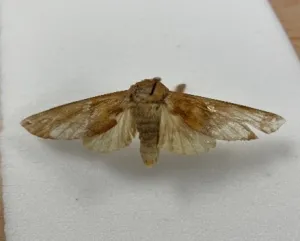RIO GRANDE CITY, Texas – U.S. Customs and Border Protection agriculture specialists at Rio Grande City Port of Entry earlier this month discovered a significant rare pest, a first in the port pest interception on a shipment of coconuts.
“Our frontline agriculture specialists continue to show their dedication to the CBP mission and that tenacity and drive resulted in the interception of a first in the port pest,” said Port Director Rogelio Olivares, Rio Grande City Port of Entry. “Significant pest interceptions like these help to protect American agriculture from serious economic harm that can be inflicted by infiltration of pest species not known to exist in the U.S.”
On Sept. 17, 2023, agriculture specialists at the Rio Grande City International Bridge import lot inspected a tractor trailer hauling a shipment of coconuts. During the examination of the trailer floor, agriculture specialists intercepted a pest that was later identified as Hapigia sp. (Notodontidae) by USDA entomologists in Los Indios, Texas. This was determined to be a first in port interception according to USDA’s Pest ID Database. The entry was canceled and the shipment was re-exported to Mexico.
The genus Hapigia falls under Notodontidae, a family of moths with 3,800 known species. Notodontidae typically feed on trees or shrubs. Some notodontids cause noticeable defoliation of their hosts.
The interception is an example of the diligent work CBP agriculture specialists do on a daily basis and which is crucial in preventing foreign pests from becoming established in the U.S. Pests that are not known to occur in the U.S. may be detrimental to the Nation’s agriculture industry. CBP agriculture specialists continue to fulfill CBP’s agriculture mission by excluding harmful pests and diseases from becoming established in the U.S.
More information regarding CBP’s agriculture inspection mission may be found on the Protecting Agriculture page and in the CBP Agriculture Specialists Inspect Imported Flowers video.


